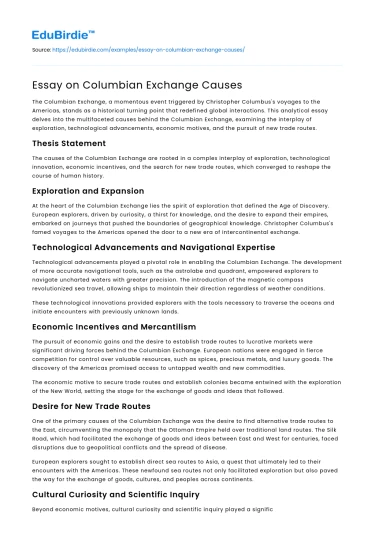The Columbian Exchange, a momentous event triggered by Christopher Columbus's voyages to the Americas, stands as a historical turning point that redefined global interactions. This analytical essay delves into the multifaceted causes behind the Columbian Exchange, examining the interplay of exploration, technological advancements, economic motives, and the pursuit of new trade routes.
Thesis Statement
The causes of the Columbian Exchange are rooted in a complex interplay of exploration, technological innovation, economic incentives, and the search for new trade routes, which converged to reshape the course of human history.
Save your time!
We can take care of your essay
- Proper editing and formatting
- Free revision, title page, and bibliography
- Flexible prices and money-back guarantee
Exploration and Expansion
At the heart of the Columbian Exchange lies the spirit of exploration that defined the Age of Discovery. European explorers, driven by curiosity, a thirst for knowledge, and the desire to expand their empires, embarked on journeys that pushed the boundaries of geographical knowledge. Christopher Columbus's famed voyages to the Americas opened the door to a new era of intercontinental exchange.
Technological Advancements and Navigational Expertise
Technological advancements played a pivotal role in enabling the Columbian Exchange. The development of more accurate navigational tools, such as the astrolabe and quadrant, empowered explorers to navigate uncharted waters with greater precision. The introduction of the magnetic compass revolutionized sea travel, allowing ships to maintain their direction regardless of weather conditions.
These technological innovations provided explorers with the tools necessary to traverse the oceans and initiate encounters with previously unknown lands.
Economic Incentives and Mercantilism
The pursuit of economic gains and the desire to establish trade routes to lucrative markets were significant driving forces behind the Columbian Exchange. European nations were engaged in fierce competition for control over valuable resources, such as spices, precious metals, and luxury goods. The discovery of the Americas promised access to untapped wealth and new commodities.
The economic motive to secure trade routes and establish colonies became entwined with the exploration of the New World, setting the stage for the exchange of goods and ideas that followed.
Desire for New Trade Routes
One of the primary causes of the Columbian Exchange was the desire to find alternative trade routes to the East, circumventing the monopoly that the Ottoman Empire held over traditional land routes. The Silk Road, which had facilitated the exchange of goods and ideas between East and West for centuries, faced disruptions due to geopolitical conflicts and the spread of disease.
European explorers sought to establish direct sea routes to Asia, a quest that ultimately led to their encounters with the Americas. These newfound sea routes not only facilitated exploration but also paved the way for the exchange of goods, cultures, and peoples across continents.
Cultural Curiosity and Scientific Inquiry
Beyond economic motives, cultural curiosity and scientific inquiry played a significant role in propelling explorers to venture into the unknown. Renaissance thinkers were driven by a thirst for knowledge and a fascination with the world's diversity. Their curiosity about the lands beyond the known horizons fueled their determination to explore and document new territories.
The cultural curiosity of these explorers resulted in the documentation of indigenous cultures, flora, fauna, and natural phenomena, contributing to the growing body of human knowledge.
Conclusion: A Nexus of Motives
The causes of the Columbian Exchange are not singular but rather a nexus of interrelated motives that converged to reshape the course of human history. Exploration, technological innovation, economic incentives, the search for new trade routes, and cultural curiosity intersected to set in motion an era of intercontinental exchange that transformed societies, economies, and cultures.
As we analyze the causes of the Columbian Exchange, we recognize the intricate web of human motivations that led to this monumental event. Understanding these causes enables us to appreciate the interconnectedness of historical events and the complex interplay of factors that shape the narrative of human progress.






 Stuck on your essay?
Stuck on your essay?

